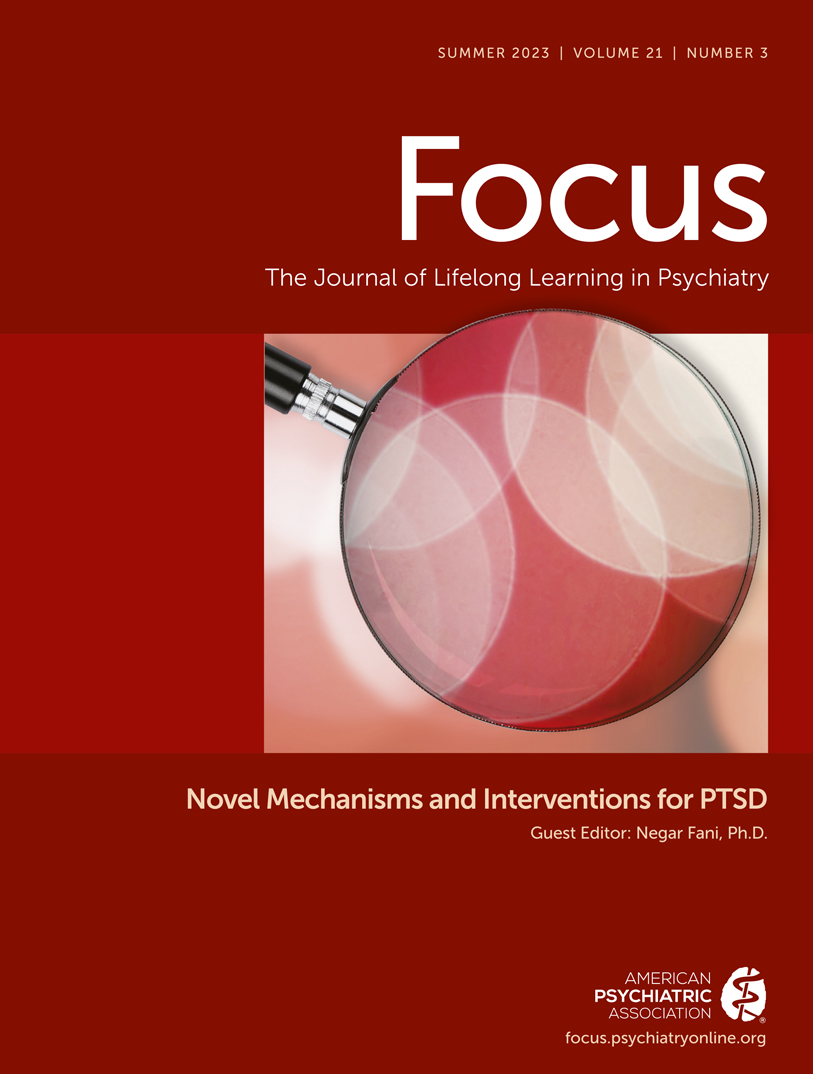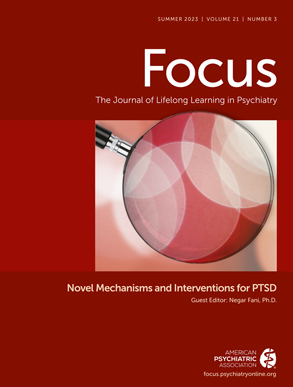Ketamine for Treatment of Posttraumatic Stress Disorder: State of the Field
Abstract
Psychotherapeutic Treatments for PTSD
Pharmacological Treatments for PTSD
Animal Models Implicate Glutamatergic N-Methyl-D-Aspartate (NMDA) Receptor Activity in Fear and Depression
Fear Acquisition and Extinction in Animals Linked to Glutamatergic NMDA Receptor Activity
Ketamine Emerges as a Treatment for Depression and Possibly for PTSD
Systemic Administration of NMDA Antagonists, Including Ketamine, Improves Depressive- and PTSD-Like Symptoms in Rodents
Ketamine Emerges as a Rapid-Acting Antidepressant and Novel Treatment for Depression
Studies Examining Effects of Peritraumatic Ketamine Administration on Development of PTSD
Ketamine as a Treatment for Chronic PTSD
First RCTs of Repeated Ketamine for Chronic PTSD
Larger RCT of Repeated Ketamine for Antidepressant-Resistant PTSD of Veterans and Active-Duty Service Members
Ketamine Studies Among Individuals With Comorbid PTSD
Framework for Understanding How Ketamine May Improve PTSD
| Publication | Diagnosis | Population | Sex, female (%) | N | Ketamine intervention | Effect on PTSD symptoms |
|---|---|---|---|---|---|---|
| Feder et al., 2014 (43) | Chronic PTSD | Community | 46 | 41 | Single intravenous (IV) infusion of ketamine hydrochloride (.5 mg/kg) vs. single IV infusion of midazolam (.045 mg/kg) | Ketamine superior to midazolam |
| Feder et al., 2021 (44) | Chronic PTSD | Community | 77 | 30 | Repeated IV infusions of ketamine hydrochloride (.5 mg/kg) vs. midazolam (.045 mg/kg), 3 times a week for 2 weeks (total six infusions) | Ketamine superior to midazolam |
| Abdallah et al., 2022 (45) | Treatment-resistant chronic PTSD | Veterans and active-duty service members | 23 | 158 | Repeated IV infusions of standard-dose ketamine (.5 mg/kg) vs. low-dose ketamine (.2 mg/kg) vs. placebo (saline), twice weekly for 4 weeks (total eight infusions) | No significant between-group differences |
Next Steps: Combining Ketamine and Psychotherapy for Chronic PTSD
| Publication | Diagnosis | Population | Sex, female (%) | N | Ketamine intervention | Therapy intervention | Study design | Effect on PTSD symptoms |
|---|---|---|---|---|---|---|---|---|
| Shiroma et al., 2020 (67) | Chronic PTSD | Veterans | 30 | 10 | Repeated IV infusions of ketamine (.5 mg/kg) once a week for 3 weeks | PE weekly for up to 10 weeks | Open label clinical trial | Improved symptoms |
| Pradhan et al., 2018 (64) | Treatment-resistant chronic PTSD | Community | 60 | 20 | Single IV infusion of ketamine (.5 mg/kg) vs. single IV infusion of normal saline | TIMBER psychotherapy, 12 sessions | Pilot randomized clinical trial | No significant between-group difference at 24 hours. Longer duration of improvement in the ketamine group |
| Keizer et al., 2020 (63) | Chronic pain and PTSD | Veterans | 27 | 11 | Continuous IV infusion of ketamine starting at 2 μg/kg/min, increased to a final dose of 11–15 μg/kg/min, lasting approximately 96 h at this final dose | Bedside psychotherapy for 90 minutes | Case series, patients receiving ketamine infusion for chronic pain | Improved symptoms |
Insights From Studies Exploring the Role of Ketamine in PTSD
Conclusions
REFERENCES
Information & Authors
Information
Published In
History
Keywords
Authors
Competing Interests
Competing Interests
Funding Information
Metrics & Citations
Metrics
Citations
Export Citations
If you have the appropriate software installed, you can download article citation data to the citation manager of your choice. Simply select your manager software from the list below and click Download.
For more information or tips please see 'Downloading to a citation manager' in the Help menu.
View Options
View options
PDF/EPUB
View PDF/EPUBLogin options
Already a subscriber? Access your subscription through your login credentials or your institution for full access to this article.
Personal login Institutional Login Open Athens loginNot a subscriber?
PsychiatryOnline subscription options offer access to the DSM-5-TR® library, books, journals, CME, and patient resources. This all-in-one virtual library provides psychiatrists and mental health professionals with key resources for diagnosis, treatment, research, and professional development.
Need more help? PsychiatryOnline Customer Service may be reached by emailing [email protected] or by calling 800-368-5777 (in the U.S.) or 703-907-7322 (outside the U.S.).

